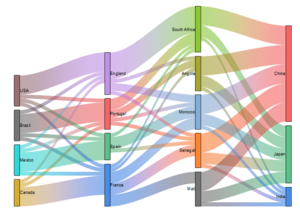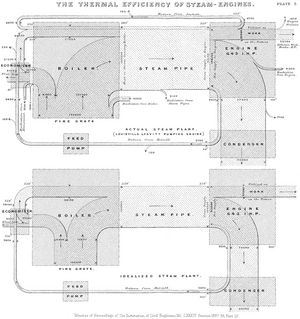Sankey Diagram
| Line 3: | Line 3: | ||
The article's aim is to highlight the usefulness of the Sankey diagram in a project & portfolio management context. The article includes a discussion of the diagram's pros and cons from the Managements perspective. | The article's aim is to highlight the usefulness of the Sankey diagram in a project & portfolio management context. The article includes a discussion of the diagram's pros and cons from the Managements perspective. | ||
| − | [[File:Sankey_Diagrams_01.png| | + | [[File:Sankey_Diagrams_01.png|300px|thumb|right|[https://www.originlab.com/doc/Origin-Help/Sankey-Diagram Sankey diagram] of flow of information between countries]] |
= Abstract = | = Abstract = | ||
Within project & portfolio management it has become even more important that leadership is able to visualize where resources are being allocated and used. This is in terms of simple supervision over the projects, but also to optimize the limited resources an organization has. | Within project & portfolio management it has become even more important that leadership is able to visualize where resources are being allocated and used. This is in terms of simple supervision over the projects, but also to optimize the limited resources an organization has. | ||
The Sankey diagrams are a graphical way of visualizing the flow of resources in a team, project, process, company, etc. Resources mapped in a Sankey diagram can be anything from materials, monetary funds, people allocation, activities, etc. | The Sankey diagrams are a graphical way of visualizing the flow of resources in a team, project, process, company, etc. Resources mapped in a Sankey diagram can be anything from materials, monetary funds, people allocation, activities, etc. | ||
| − | Beginning in 1898, the Sankey diagram was first used by an Irish captain named Matthew Henry Phineas Riall Sankey. This first implementation of the diagram showed the energy efficiency of a steam engine.<ref>|url=https://zenodo.org/record/2036163#.YggSQurMK3A</ref> [[File:Sankey1898.png| | + | Beginning in 1898, the Sankey diagram was first used by an Irish captain named Matthew Henry Phineas Riall Sankey. This first implementation of the diagram showed the energy efficiency of a steam engine.<ref>|url=https://zenodo.org/record/2036163#.YggSQurMK3A</ref> [[File:Sankey1898.png|300px|thumb|right|Captain Sankey's 1898 Steam engine diagram]] |
= References = | = References = | ||
<references/> | <references/> | ||
Revision as of 20:34, 12 February 2022
By Sonia Guerra Loji (s203379)
The article's aim is to highlight the usefulness of the Sankey diagram in a project & portfolio management context. The article includes a discussion of the diagram's pros and cons from the Managements perspective.

Abstract
Within project & portfolio management it has become even more important that leadership is able to visualize where resources are being allocated and used. This is in terms of simple supervision over the projects, but also to optimize the limited resources an organization has. The Sankey diagrams are a graphical way of visualizing the flow of resources in a team, project, process, company, etc. Resources mapped in a Sankey diagram can be anything from materials, monetary funds, people allocation, activities, etc.
Beginning in 1898, the Sankey diagram was first used by an Irish captain named Matthew Henry Phineas Riall Sankey. This first implementation of the diagram showed the energy efficiency of a steam engine.[1]